Fleurs du Mal Magazine



Amy Winehouse: A Family Portrait
until 15 September 2013
The Jewish Museum is staging an original exhibition about Amy Winehouse, co-curated with her brother Alex and sister-in-law Riva. It is an intimate and moving exhibition about a much loved sister.
The family have given the Jewish Museum unprecedented access to Amy’s personal belongings that celebrate her passion for music, fashion, sudoku, Snoopy, London and her family.
Amy was close to her family and had a strong sense of her Jewish roots and heritage. Among the various objects on display, the exhibition will show many unseen photographs of Amy’s family life – Friday night dinners, Alex’s Barmitzvah and vintage photographs of their beloved grandmother Cynthia.
Located in Amy’s Camden Town, the Jewish Museum is the perfect place to find out about the woman behind the music and beyond the hype.
≡ website jewish museum london
fleursdumal.nl magazine
More in: Amy Winehouse, Amy Winehouse, FDM in London

Gilbert Keith Chesterton
(1874-1936)
BY THE BABE UNBORN
If trees were tall and grasses short,
As in some crazy tale,
If here and there a sea were blue
Beyond the breaking pale,
If a fixed fire hung in the air
To warm me one day through,
If deep green hair grew on great hills,
I know what I should do.
In dark I lie: dreaming that there
Are great eyes cold or kind,
And twisted streets and silent doors,
And living men behind.
Let storm-clouds come: better an hour,
And leave to weep and fight,
Than all the ages I have ruled
The empires of the night.
I think that if they gave me leave
Within that world to stand,
I would be good through all the day
I spent in fairyland.
They should not hear a word from me
Of selfishness or scorn,
If only I could find the door,
If only I were born.
THE DONKEY
When fishes flew and forests walked
And figs grew upon thorn,
Some moment when the moon was blood
Then surely I was born;
With monstrous head and sickening cry
And ears like errant wings,
The devil’s walking parody
On all four-footed things.
The tattered outlaw of the earth,
Of ancient crooked will;
Starve, scourge, deride me: I am dumb,
I keep my secret still.
Fools! For I also had my hour;
One far fierce hour and sweet:
There was a shout about my ears,
And palms before my feet.
THE SONG OF THE CHILDREN
The World is ours till sunset,
Holly and fire and snow;
And the name of our dead brother
Who loved us long ago.
The grown folk mighty and cunning,
They write his name in gold;
But we can tell a little
Of the million tales he told.
He taught them laws and watchwords,
To preach and struggle and pray;
But he taught us deep in the hayfield
The games that the angels play.
Had he stayed here for ever,
Their world would be wise as ours–
And the king be cutting capers,
And the priest be picking flowers.
But the dark day came: they gathered:
On their faces we could see
They had taken and slain our brother,
And hanged him on a tree.
THOU SHALT NOT KILL
I had grown weary of him; of his breath
And hands and features I was sick to death.
Each day I heard the same dull voice and tread;
I did not hate him: but I wished him dead.
And he must with his blank face fill my life–
Then my brain blackened; and I snatched a knife.
But ere I struck, my soul’s grey deserts through
A voice cried, ‘Know at least what thing you do.’
‘This is a common man: knowest thou, O soul,
What this thing is? somewhere where seasons roll
There is some living thing for whom this man
Is as seven heavens girt into a span,
For some one soul you take the world away–
Now know you well your deed and purpose. Slay!’
Then I cast down the knife upon the ground
And saw that mean man for one moment crowned.
I turned and laughed: for there was no one by–
The man that I had sought to slay was I.
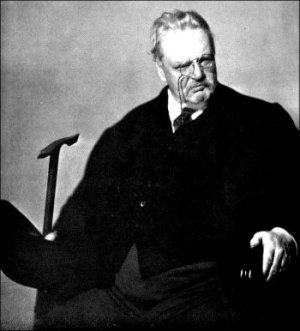
THE MIRROR OF MADMEN
I dreamed a dream of heaven, white as frost,
The splendid stillness of a living host;
Vast choirs of upturned faces, line o’er line.
Then my blood froze; for every face was mine.
Spirits with sunset plumage throng and pass,
Glassed darkly in the sea of gold and glass.
But still on every side, in every spot,
I saw a million selves, who saw me not.
I fled to quiet wastes, where on a stone,
Perchance, I found a saint, who sat alone;
I came behind: he turned with slow, sweet grace,
And faced me with my happy, hateful face.
I cowered like one that in a tower doth bide,
Shut in by mirrors upon every side;
Then I saw, islanded in skies alone
And silent, one that sat upon a throne.
His robe was bordered with rich rose and gold,
Green, purple, silver out of sunsets old;
But o’er his face a great cloud edged with fire,
Because it covereth the world’s desire.
But as I gazed, a silent worshipper,
Methought the cloud began to faintly stir;
Then I fell flat, and screamed with grovelling head,
‘If thou hast any lightning, strike me dead!
‘But spare a brow where the clean sunlight fell,
The crown of a new sin that sickens hell.
Let me not look aloft and see mine own
Feature and form upon the Judgment-throne.’
Then my dream snapped: and with a heart that leapt
I saw across the tavern where I slept,
The sight of all my life most full of grace,
A gin-damned drunkard’s wan half-witted face.
THE SKELETON
Chattering finch and water-fly
Are not merrier than I;
Here among the flowers I lie
Laughing everlastingly.
No: I may not tell the best;
Surely, friends, I might have guessed
Death was but the good King’s jest,
It was hid so carefully.
THE HAPPY MAN
To teach the grey earth like a child,
To bid the heavens repent,
I only ask from Fate the gift
Of one man well content.
Him will I find: though when in vain
I search the feast and mart,
The fading flowers of liberty,
The painted masks of art.
I only find him at the last,
On one old hill where nod
Golgotha’s ghastly trinity–
Three persons and one god.
A NOVELTY
Why should I care for the Ages
Because they are old and grey?
To me, like sudden laughter,
The stars are fresh and gay;
The world is a daring fancy,
And finished yesterday.
Why should I bow to the Ages
Because they were drear and dry?
Slow trees and ripening meadows
For me go roaring by,
A living charge, a struggle
To escalade the sky.
The eternal suns and systems,
Solid and silent all,
To me are stars of an instant,
Only the fires that fall
From God’s good rocket, rising
On this night of carnival.
g.k. chesterton poetry
fleursdumal.nl magazine
More in: Chesterton, Gilbert Keith, G.K. Chesterton
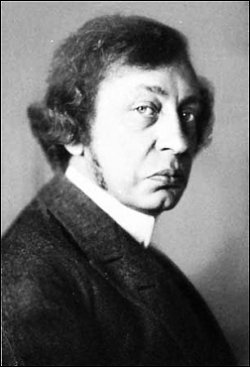
Karel van de Woestijne
1878-1929
Gij zijt de goede vrouw…
Gij zijt de goede vrouw ten drempel mijner dood, –
gij die me uw oogen als een zomer-nacht ontsloot
vol wondre lichten en vol rust’ge duisterheden;
gij die me uw leden als de rijkste herfsten bracht,
en, schooner dan een schemering, de zéekre kracht
van vredig leven en zich goed bemind te weten.
Want gij, die weet hoe iedre vreugde tanen moet,
gij mínt me; – en ‘lijk een god de dood der zon begroet
met stille liefde, al heeft hij vreugde-vol geschapen
die zon: zoo mint ge in mij wat ge in u-zelf voelt slapen
en dat in mij voor eeuw’gen slaap moe de oogen sloot,
ons moede liefde, o vrouw, ten drempel mijner dood.
karel van de woestijne poetry
fleursdumal.nl magazine
More in: Archive W-X, Woestijne, Karel van de
.jpg)
Cesar Vallejo
(1892 – 1938)
Tiempo, tiempo
Tiempo, tiempo
Mediodía estancado entre relentes.
Bomba aburrida del cuartel achica
tiempo tiempo tiempo tiempo.
Era Era.
Gallos cancionan escarbando en vano.
Boca del claro día que conjuga
era era era era.
Mañana Mañana.
El reposo caliente aun de ser.
Piensa el presente guárdame para
mañana mañana mañana mañana.
Nombre Nombre.
¿Qué se llama cuanto heriza nos?
Se llama Lomismo que padece
nombre nombre nombre nombre.
Cesar Vallejo poetry
fleursdumal.nl magazine
More in: Archive U-V, Vallejo, Cesar

Klimaat
De aarde draait rond
zeker weten
mijn hoofd in het vierkant
dikwijls, soms
het gevaar loert van alle kanten
eenvoudig lijkt het
het leven en de kunst
maar zintuigen sputteren tegen
gedachten weten beter
terug naar de kern
de grondvoorraden slinken
het klimaat warmt op
ozonlaag en natuurplagen
zuurtegraad en woedevlagen
we schreeuwen moord en brand
respect voor de natuur
in al haar vormen
andere denkwijze
gewoontes aanpassen
vijf voor twaalf
kleine inspanningen
grote stap in het behoud
van onze aarde
de kunst van bewust leven
nog niets verloren
Erica De Stercke
fleursdumal.nl magazine
More in: Archive C-D, De Stercke, Erika
.jpg)
Märchen der Brüder Grimm
Jacob Grimm (1785-1863) & Wilhelm Grimm (1786-1859)
Die drei Sprachen
In der Schweiz lebte einmal ein alter Graf, der hatte nur einen einzigen Sohn, aber er war dumm und konnte nichts lernen. Da sprach der Vater: “Höre, mein Sohn, ich bringe nichts in deinen Kopf, ich mag es anfangen, wie ich will. Du mußt fort von hier, ich will dich einem berühmten Meister übergeben. der soll es mit dir versuchen.” Der Junge ward in eine fremde Stadt geschickt, und blieb bei dem Meister ein ganzes Jahr. Nach Verlauf dieser Zeit kam er wieder heim, und der Vater fragte: “Nun mein Sohn, was hast du gelernt?” – “Vater, ich habe gelernt, was die Hunde bellen,” antwortete er. “Daß Gott erbarm!” rief der Vater aus, “ist das alles, was du gelernt hast? ich will dich in eine andere Stadt zu einem andern Meister tun.”
Der Junge ward hingebracht, und blieb bei diesem Meister auch ein Jahr. Als er zurückkam, fragte der Vater wiederum: “Mein Sohn, was hast du gelernt?” Er antwortete: “Vater, ich habe gelernt, was die Vögli sprechen.” Da geriet der Vater in Zorn und sprach: “O, du verlorner Mensch, hast die kostbare Zeit hingebracht und nichts gelernt, und schämst dich nicht, mir unter die Augen zu treten? Ich will dich zu einem dritten Meister schicken, aber lernst du auch diesmal nichts, so will ich dein Vater nicht mehr sein.” Der Sohn blieb bei dem dritten Meister ebenfalls ein ganzes Jahr, und als er wieder nach Haus kam und der Vater fragte: “Mein Sohn, was hast du gelernt?” so antwortete er: “Lieber Vater, ich habe dieses Jahr gelernt, was die Frösche quaken.” Da geriet der Vater in den höchsten Zorn, sprang auf, rief seine Leute herbei und sprach:“Dieser Mensch ist mein Sohn nicht mehr, ich stoße ihn aus und gebiete euch, daß ihr ihn hinaus in den Wald führt und ihm das Leben nehmt.” Sie führten ihn hinaus, aber als sie ihn töten sollten, konnten sie nicht vor Mitleiden und ließen ihn gehen. Sie schnitten einem Reh Augen und Zunge aus, damit sie dem Alten die Wahrzeichen bringen konnten.
Der Jüngling wanderte fort und kam nach einiger Zeit zu einer Burg, wo er um Nachtherberge bat. “Ja,” sagte der Burgherr, “wenn du da unten in dem alten Turm übernachten willst, so gehe hin, aber ich warne dich, es ist lebensgefährlich, denn er ist voll wilder Hunde, die bellen und heulen in einem fort, und zu gewissen Stunden müssen sie einen Menschen ausgeliefert haben, den sie auch gleich verzehren.” Die ganze Gegend war darüber in Trauer und Leid, und konnte doch niemand helfen. Der Jüngling aber war ohne Furcht und sprach: “Laßt mich nur hinab zu den bellenden Hunden, und gebt mir etwas, das ich ihnen vorwerfen kann; mir sollen sie nichts tun.” Weil er nun selber nicht anders wollte, so gaben sie ihm etwas Essen für die wilden Tiere und brachten ihn hinab zu dem Turm. Als er hineintrat, bellten ihn die Hunde nicht an, wedelten mit den Schwänzen ganz freundlich um ihn herum, fraßen, was er ihnen hinsetzte, und krümmten ihm kein Härchen. Am andern Morgen kam er zu jedermanns Erstaunen gesund und unversehrt wieder zum Vorschein und sagte zu dem Burgherrn: “Die Hunde haben mir in ihrer Sprache offenbart, warum sie da hausen und dem Lande Schaden bringen. Sie sind verwünscht und müssen einen großen Schatz hüten, der unten im Turme liegt, und kommen nicht eher zur Ruhe, als bis er gehoben ist, und wie dies geschehen muß, das habe ich ebenfalls aus ihren Reden vernommen.” Da freuten sich alle, die das hörten, und der Burgherr sagte, er wollte ihn an Sohnes Statt annehmen, wenn er es glücklich vollbrächte. Er stieg wieder hinab, und weil er wußte, was er zu tun hatte, so vollführte er es und brachte eine mit Gold gefüllte Truhe herauf. Das Geheul der wilden Hunde ward von nun an nicht mehr gehört, sie waren verschwunden, und das Land war von der Plage befreit.
Über eine Zeit kam es ihm in den Sinn, er wollte nach Rom fahren. Auf dem Weg kam er an einem Sumpf vorbei, in welchem Frösche saßen und quakten. Er horchte auf, und als er vernahm, was sie sprachen, ward er ganz nachdenklich und traurig. Endlich langte er in Rom an, da war gerade der Papst gestorben, und unter den Kardinälen großer Zweifel, wen sie zum Nachfolger bestimmen sollten. Sie wurden zuletzt einig, derjenige sollte zum Papst erwählt werden, an dem sich ein göttliches Wunderzeichen offenbaren würde. Und als das eben beschlossen war, in demselben Augenblick trat der junge Graf in die Kirche, und plötzlich flogen zwei schneeweiße Tauben auf seine beiden Schultern und blieben da sitzen. Die Geistlichkeit erkannte darin das Zeichen Gottes und fragte ihn auf der Stelle, ob er Papst werden wolle. Er war unschlüssig und wußte nicht, ob er dessen würdig wäre, aber die Tauben redeten ihm zu, daß er es tun möchte, und endlich sagte er “Ja.” Da wurde er gesalbt und geweiht, und damit war eingetroffen, was er von den Fröschen unterwegs gehört und was ihn so bestürzt gemacht hatte, daß er der heilige Papst werden sollte. Darauf mußte er eine Messe singen und wußte kein Wort davon, aber die zwei Tauben saßen stets auf seinen Schultern und sagten ihm alles ins Ohr.
ENDE
Die Märchen der Brüder Grimm
fleursdumal.nl magazine
More in: Grimm, Grimm, Andersen e.o.: Fables, Fairy Tales & Stories, Grimm, Jacob & Wilhelm
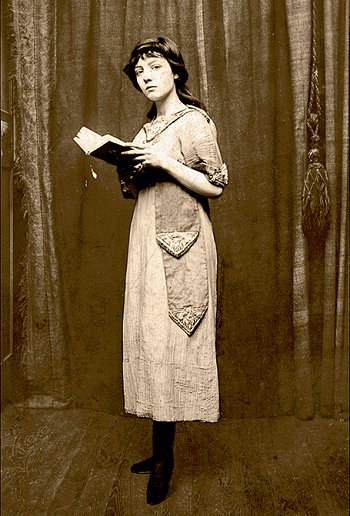
Mireille Havet
(1898-1932)
À un très petit enfant
Pendant la Guerre
Le vent qui souffle ! Tu ne t’en occupes pas.
La guerre qui souffle ! Tu ne t’en occupes pas.
Peu à peu tu apprendras
que sur la terre il y a des orages
et la pluie drue pendant des jours.
Peu à peu tu apprendras
que la haine existe vivace et ardente :
Et le désir de tuer des hommes innocents
parfaitement inconnus de nom et de visage
…. qui auraient pu être des frères
si on avait voulu !
Ô Toi ! Né pendant la guerre
la plus folle ! la plus absolue.
Toi ! spectateur impassible et incompréhensif
qui ne jugeras que bien plus tard,
quand seront éteintes les flammes
et balayées les cendres.
Toi ! qui viens pour reconstruire
avec toute la tendresse de ton regard
bien disposé et sans méfiance,
avec tes mains si douces…. et roses
où peu à peu se dessineront
les grandes lignes de l’existence.
Te voici envoyé vers nous,
avec la perspective de ton enfance
inconsciente et échevelée,
pendant que se finira la guerre démente
et que nous planterons nos croix !
Tu ne viens, ni pour pleurer
ni pour souffrir
en quoi que ce soit, du malheur de notre année !
Tu viens, Promesse d’Avenir,
pour établir et contempler la paix !
Ô mon petit Enfant,
pour l’instant, dans le soleil,
tu joues avec le sable de cette terre
pour laquelle le sang coule
incompressible depuis des mois !
Et tout à l’heure, quand le soleil dormira
sur nos chantiers de morts,
tu souriras à la lumière de ta veilleuse
entre les voiles de ton berceau blanc.
Tu ne sais rien. Ton âme est close.
Tu es la chrysalide du lendemain.
Et je te regarde, affolée par tant d’innocence
et de certitude.
Ta tâche n’est pas la plus douce.
Constructeur parmi les décombres :
Il te faudra aller sans défaillance,
ne pas croire que la vie est mauvaise
parce que la mort fut un instant
la plus forte !
Tout reprendra avec tes soins.
Génération de vie laborieuse et fervente
après notre génération de sacrifices et de croix
— Efflorescence merveilleuse sur nos morts. —
Le soleil se refera d’une clarté éblouissante
et le blé sera haut dans les champs
avec des cigales dedans.
Des maisons blanches seront bâties
au bord des rivières :
au bord de la Meuse, de la Marne, du Rhin !
Et vous saurez être heureux encore
d’un bonheur neuf et vigoureux
comme votre sang d’enfants nés pendant la guerre.
Mais en ce moment : Tu dors,
ignorant la terre, le vent, la lutte ;
tes yeux fermés abritent le secret
de ton âme
qui est bien la plus forte…
avec son rôle à venir
et l’inconscience de son rêve actuel
où se mire l’éternité.
La Maison dans l’œil du chat
Paris, éditions Georges Crès & Cie, 1917
Mireille Havet poetry
fleursdumal.nl magazine
More in: Archive G-H, Havet, Mireille, Mireille Havet
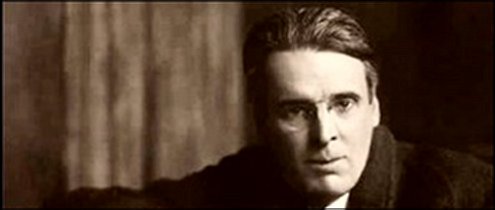
W i l l i a m B u t l e r Y e a t s
(1865-1939)
May God be praised for woman
T h r e e P o e m s
Politics
How can I, that girl standing there,
My attention fix
On Roman or on Russian
Or on Spanish politics?
Yet here’s a travelled man that knows
What he talks about,
And there’s a politician
That has read and thought,
And maybe what they say is true
Of war and war’s alarms,
But O that I were young again
And held her in my arms!
To A Young Girl
My dear, my dear, I know
More than another
What makes your heart beat so;
Not even your own mother
Can know it as I know,
Who broke my heart for her
When the wild thought,
That she denies
And has forgot,
Set all her blood astir
And glittered in her eyes.
On Woman
May God be praised for woman
That gives up all her mind,
A man may find in no man
A friendship of her kind
That covers all he has brought
As with her flesh and bone,
Nor quarrels with a thought
Because it is not her own.
Though pedantry denies,
It’s plain the Bible means
That Solomon grew wise
While talking with his queens.
Yet never could, although
They say he counted grass,
Count all the praises due
When Sheba was his lass,
When she the iron wrought, or
When from the smithy fire
It shuddered in the water:
Harshness of their desire
That made them stretch and yawn,
pleasure that comes with sleep,
Shudder that made them one.
What else He give or keep
God grant me — no, not here,
For I am not so bold
To hope a thing so dear
Now I am growing old,
But when, if the tale’s true,
The Pestle of the moon
That pounds up all anew
Brings me to birth again —
To find what once I had
And know what once I have known,
Until I am driven mad,
Sleep driven from my bed.
By tenderness and care.
pity, an aching head,
Gnashing of teeth, despair;
And all because of some one
perverse creature of chance,
And live like Solomon
That Sheba led a dance.
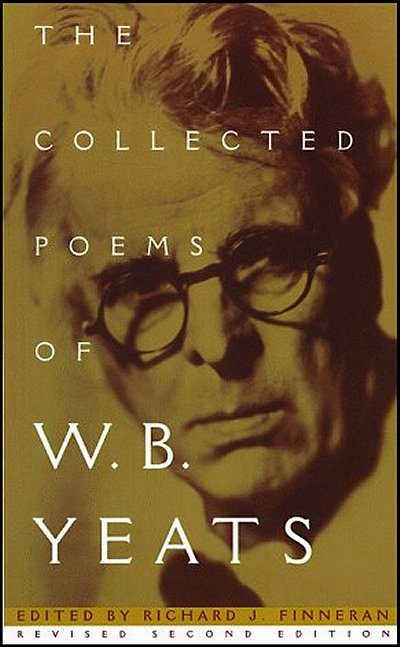
FLEURSDUMAL.NL MAGAZINE
MAGAZINE FOR ART & LITERATURE
More in: Archive Y-Z, Yeats, William Butler
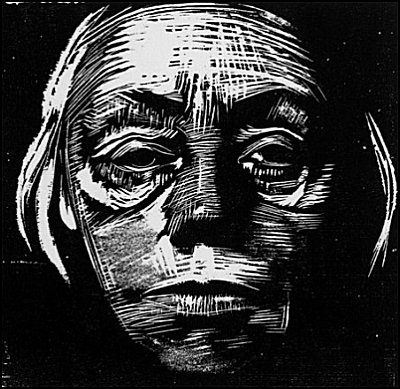
K ä t h e K o l l w i t z
D i e T o t e n m a h n e n u n s
( I I ) B i l d e r
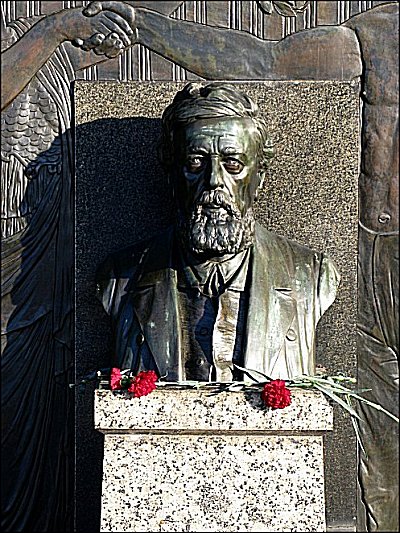
Denkmal Karl Liebknecht
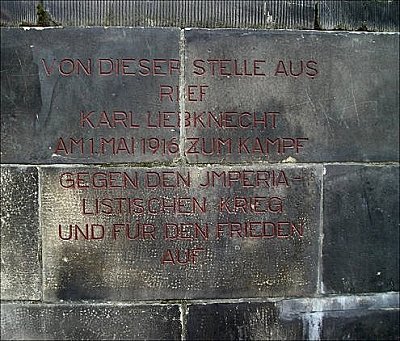
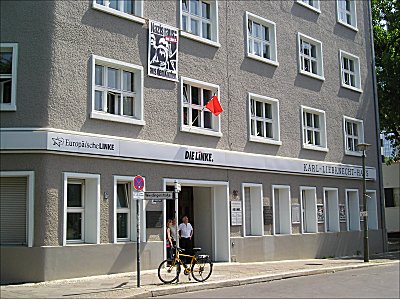
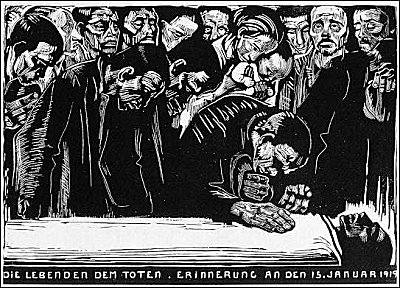
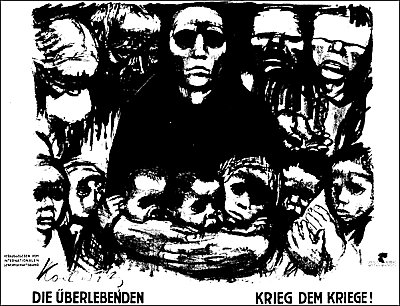
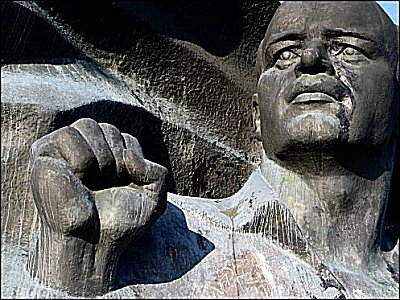
Denkmal Ernst Thalmann
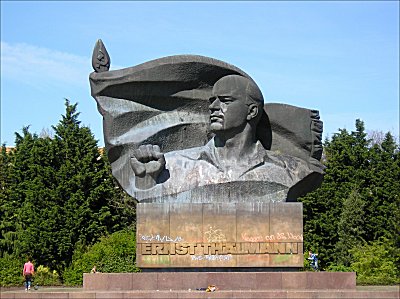
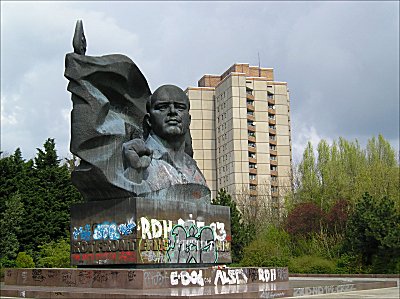

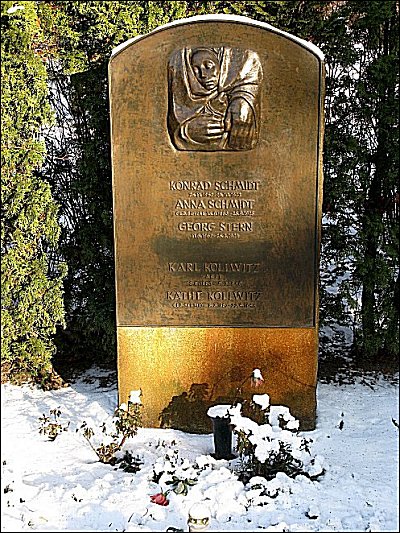
.jpg)
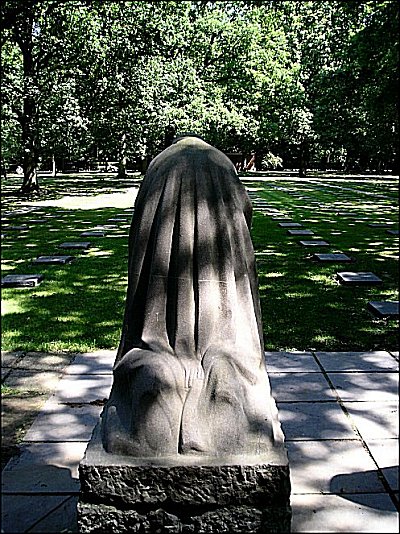

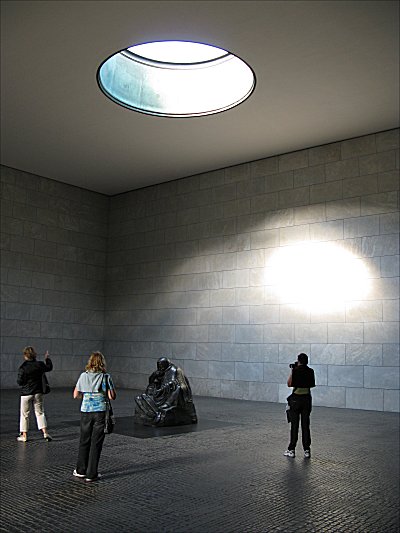
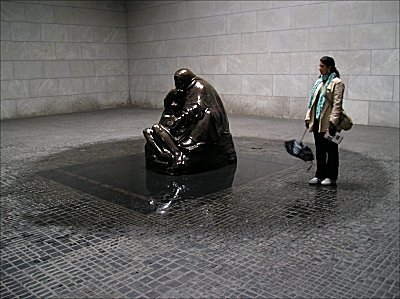

Käthe Kollwitz
Die Toten mahnen uns (II) Bilder
Photos: Anton K. Berlin
fleursdumal.nl magazine – magazine for art & literature
More in: *War Poetry Archive, Anton K. Photos & Observations, Käthe Kollwitz
Thank you for reading Fleurs du Mal - magazine for art & literature